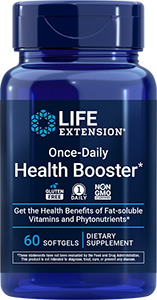
Do Vitamins Expire? Storage, Safety & Disposal Tips
Published: December 2022
Maintaining your best health has become easier than ever with today's wealth of wellness information and dietary supplements designed to help fill your nutritional gaps. But using supplements to optimize your nutrient levels comes with some caveats, such as making sure you are taking your supplements routinely and storing them safely.
What about vitamin expiration dates? If vitamins and supplements are a regular part of your wellness routine, you're likely using them up before they can expire. But if you use them on occasion—or maybe you're worried about that case of chewable multivitamins you bought on impulse the last time you were shopping at a discount warehouse—you need to take a good, hard look at the fine print on the label, where you'll find an expiration date printed.
If that date reveals that indeed, your supplement is past its prime, it's time to give those vitamins a new home: in your trash can. Need more supplement tips? Here's what you should consider to make sure you are getting the potency you expect from your supplement.
Why do vitamins expire?
The expiration dates on vitamins and supplements indicate quality, or potency. After vitamins expire, they may no longer provide 100% of the levels stated on the product label. We recommend discarding any product past expiration and replenishing your supply.
How to know when your vitamins are about to expire?
Companies typically have an expiration date for their vitamins and supplements listed on the product packaging, although the FDA does not require them by law. We don't recommend buying supplements that don't have an expiration date. Why? When a manufacturer includes an expiration date, they must show evidence to support that the product will be effective until that date. This evidence isn't required if a date isn't provided—and your best bet is always to go with a supplement brand that has full product transparency and can verify efficacy.
Pro tip: Not sure how to choose high-quality supplements? Download this FREE eBook for easy guidelines.
How to store your vitamins: Liquid vs. gummies vs. capsules
Storing your vitamins and supplements properly is the best way to maintain the potency of the products you buy, because environmental elements such as humidity, heat and sunlight can shorten the shelf life of your supplements and degrade the quality of the ingredients. So, where should you keep them?
Despite its convenience, the bathroom cabinet is actually not a good place to put your multivitamin, or any supplement. Moisture is the biggest threat to the shelf life of most supplements, and this room is full of it! If your dietary supplement is shelf-stable, the refrigerator is out, too. Instead, store your products in a cool, dry place out of direct sunlight. Try to pick a place that you visit often enough during the day to remind you to take your supplements regularly, too. That can be your desk at work, the dining room table, or the pantry where you keep all of those healthy snacks!
Some probiotics and liquid omega-3 oils do require refrigeration to maintain their shelf life—and this should be stated on the label. Otherwise, avoid storing supplements in your fridge. It might be convenient, but when you open a cold container of multivitamins or gummy vitamins, warm air rushes in and is trapped inside when you put the lid back on and put the container back in the fridge. That warm air then cools, causing condensation right where you don't want it.
Of all supplement forms, softgels are least likely to degrade from deliquescence (a fancy word for taking up moisture from the atmosphere). If anything, excessive drying can make softgels become brittle over time. But heat and moisture can cause gummies to clump together, and they can also accelerate the degradation of capsules.
Explore Our Best General Health & Wellness Supplements
Can you freeze supplements?
Buying in bulk? Because we tend to buy more of something when it is on sale to take advantage of the better prices, we may buy a supplement months before we intend to use it. In this case, we recommend refrigerating or freezing the sealed products to store them. Allow the supplement container to reach room temperature before opening it, and do not return it to the refrigerator. Once open, the product should be stored in a cool, dry place to preserve its potency as long as possible.
Can you use your vitamins after the expiration date?
No, you should not. Life Extension does not recommend or suggest taking a product after its expiration. While vitamins and minerals are quite stable, especially when kept away from direct sunlight, moisture and high temperatures, that doesn't mean you should take them if they've expired. Most Life Extension® products have a two-year optimal "use by" date. That means we certify the product will continue to meet or exceed label claim for two years from the date of manufacture.
How do you safely dispose of expired vitamins?
You can safely dispose of expired vitamin supplements by taking them to a drop-off location. Pharmacies may also accept them for disposal. The FDA recommends that if you dispose of them at home, remove them from their containers and mix them with coffee grounds, cat litter, or dirt to make them less appealing to children and pets who may go through the trash.
How to take vitamins for optimal results
Want to get the most out of your supplement routine? Above all else, read the label and follow the directions precisely regarding optimal nutrition dosage and directions.
Your label should indicate:
To eat or not to eat?
Whether it should be taken with food. Some vitamins, especially fat-soluble vitamins—such as vitamin D and vitamins A, E and K—are better absorbed when taken with food. Minerals such as calcium and magnesium may also be absorbed more comfortably with food.Divide and conquer or better together?
Whether the supplement should be taken in divided doses. (For example, science-backed studies suggest taking calcium supplements in divided doses with food in the morning and evening to yield the best results.)Storage tips.
Some supplement labels will explain how best to store your product to maintain optimal potency.
Other tips for success: Do’s and Don'ts
DO ask questions.
If you're not sure whether a supplement is expired, how to take it or how to store it, reach out to the manufacturer! (At Life Extension, we offer expert support seven days a week to answer exactly these kinds of questions.)DON'T slack.
Be consistent in your usage; consume them as directed every day to get the best results. Sometimes taking them at the same time each day helps create a routine to promote consistency. Or, set up reminders in your smartphone.DO stay healthy.
Take supplements in conjunction with a healthy lifestyle, such as regular exercise and a balanced diet. Remember they are nutritional supplements, not replacements.
Don't know where to start with supplements? Our health quizzes can help identify your nutrient needs and suggest products that might help!
References
- "Supplement Frequently Asked Questions." NSF. https://www.nsf.org/blog/consumer/supplement-frequently-asked-questions
- "Where and How to Dispose of Unused Medicines." FDA. April 2021. https://www.fda.gov/consumers/consumer-updates/where-and-how-dispose-unused-medicines
Always be in the know!
Access the latest deals, wellness news, expert health tips & more!








